Key Takeaways:
- Palestinian fighters are attacking Israeli forces in areas of the northern Gaza Strip where Israeli forces conducted clearing operations previously.
- The Gaza Strip is experiencing the longest, largest-scale internet blackout since the Israel-Hamas war began.
- Israel and Hamas began implementing a deal on January 17 that aims to supply medicine for Israeli hostages in exchange for additional humanitarian flow into the Gaza Strip.
- IDF Chief of Staff Herzi Halevi said that the likelihood of war in northern Israel is “higher than before” on January 17 while attending IDF drills simulating an offensive in Lebanon.
- Iraqi Prime Minister Mohammad Shia al Sudani is attempting to retain some US presence in Iraq by restructuring Iraq’s security agreement, despite pressure from Iranian-backed Iraqi groups to expel US forces entirely. This policy is at odds with Iranian-backed Iraqi actors’ maximalist demands to immediately remove all US forces from Iraq.
- The US State Department redesignated the Houthis as specially designated global terrorists on January 17.
- The Pakistani government has strongly condemned and warned of possible retaliation for the IRGC strikes.
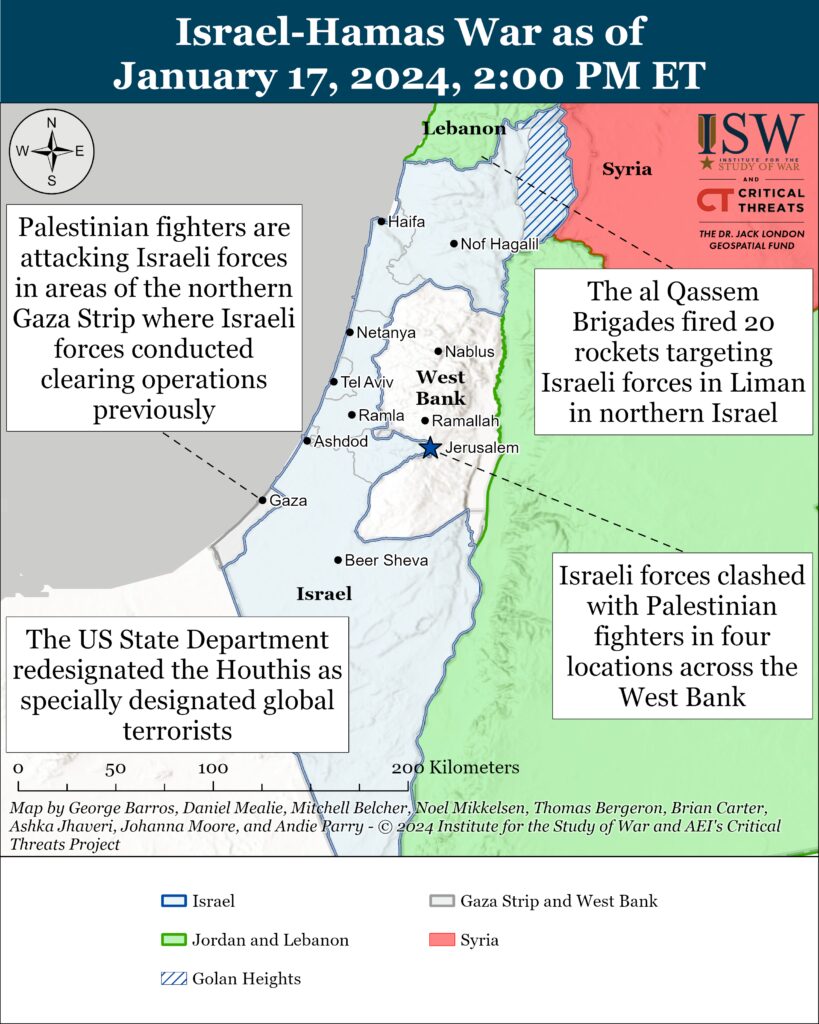
Gaza Strip
Axis of Resistance campaign objectives:
Erode the will of the Israeli political establishment and public to launch and sustain a major ground operation into the Gaza Strip
Degrade IDF material and morale around the Gaza Strip.
Palestinian fighters are attacking Israeli forces in areas of the northern Gaza Strip where Israeli forces conducted clearing operations previously. CTP-ISW reported on January 16 that Palestinian militias have renewed attacks in the northern Gaza Strip, particularly around Jabalia and Sheikh Radwan.[i] Hamas’ military wing, the al Qassem Brigades, conducted five attacks in Jabalia, Sheikh Radwan, and Karama neighborhoods on January 17.[ii] The self-proclaimed military wing of Fatah, the al Aqsa Martyrs’ Brigades, fired rocket-propelled grenades (RPG) and small arms at Israeli forces in Karama as well.[iii] A Palestinian journalist reported on January 17 that Israeli forces entered Rimal neighborhood in southwestern Gaza City. CTP-ISW assessed on January 16 that Palestinian militias are likely reinfiltrating this area.[iv] The Israel Defense Forces (IDF) reported on January 17 that its forces directed an airstrike that targeted two Palestinian fighters in Sheikh Ijlin neighborhood in southwestern Gaza City. The IDF also found large amounts of weapons in the area.[v]
Palestinian militia activity renewed slightly during the past week in other locations where Israeli forces have conducted clearing operations in the northern Gaza Strip, as well. The al Qassem Brigades and the military wing of the Democratic Front for the Liberation of Palestine (DFLP), the National Resistance Brigades, claimed that they attacked Israeli forces east of Tuffah.[vi] The IDF conducted raids in Tuffah up until January 7.[vii] The National Resistance Brigades also fired small arms at Israeli infantrymen north of Shujaiya.[viii]
The IDF 646th Paratrooper Brigade (assigned to the 99th Division) located rocket launchers that Hamas used to attack Israel on January 16.[ix] The 99th Division has been conducting clearing operations in the Central Governorate of the Gaza Strip for nearly a week.[x] Israeli media reported that the al Qassem Brigades fired the rocket salvo into southern Israel from areas in the central Gaza Strip where Israeli forces recently withdrew.[xi]
Palestinian militias launched several attacks on Israeli forces operating in the Central Governorate of the Gaza Strip on January 16. The al Qassem Brigades reported on January 16 that its fighters returned from the areas of fighting in Maghazi and reported several different attacks in the area on Israeli infantry and armor.[xii] The militia targeted an Israeli military bulldozer with an anti-tank improvised explosive device in a combined attack with the military wing of Palestinian Islamic Jihad (PIJ), the al Quds Brigades.[xiii] The al Quds Brigades fighters returned from areas of fighting in Bureij and reported that they conducted several attacks using rocket-propelled grenades and mortars targeting IDF forces near Bureij using rocket-propelled grenades and mortars.[xiv] A Palestinian journalist reported on January 17 that Israeli forces are operating in Deir al Balah, Nuseirat, Bureij, and Maghazi.[xv]
The IDF 98th Division continued to conduct clearing operations in Khan Younis on January 17. Israeli forces resupplied the 98th Division by airdrop in southern Khan Younis City sometime in the last few days.[xvi] The IDF has conducted five aerial supply operations since the beginning of the fighting.[xvii] The 7th Armored Brigade directed a helicopter attack targeting two Palestinian fighters who launched mortars at them in Khan Younis.[xviii]
Hamas and other Palestinian militias are continuing their efforts to defend against Israeli armor and dismounted infantry since December 3. The al Quds Brigades fired an anti-tank guided missile (ATGM) that targeted an IDF combat outpost in southern Khan Younis City on January 17.[xix] The al Qassem Brigades also targeted Israeli armor and other IDF units using anti-tank RPGs and mortars in and south of Khan Younis City.[xx] A Palestinian journalist reported on January 17 that fighting between Israeli forces and Palestinian fighters in Khan Younis was the most intense in over two months of fighting.[xxi]
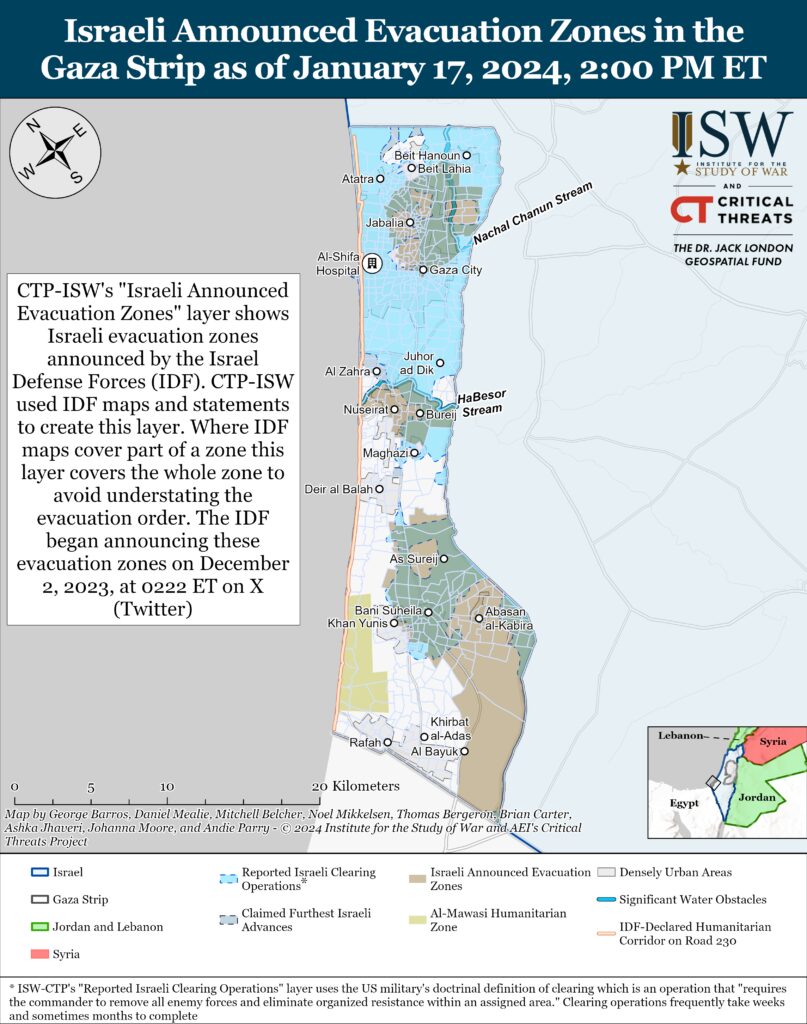
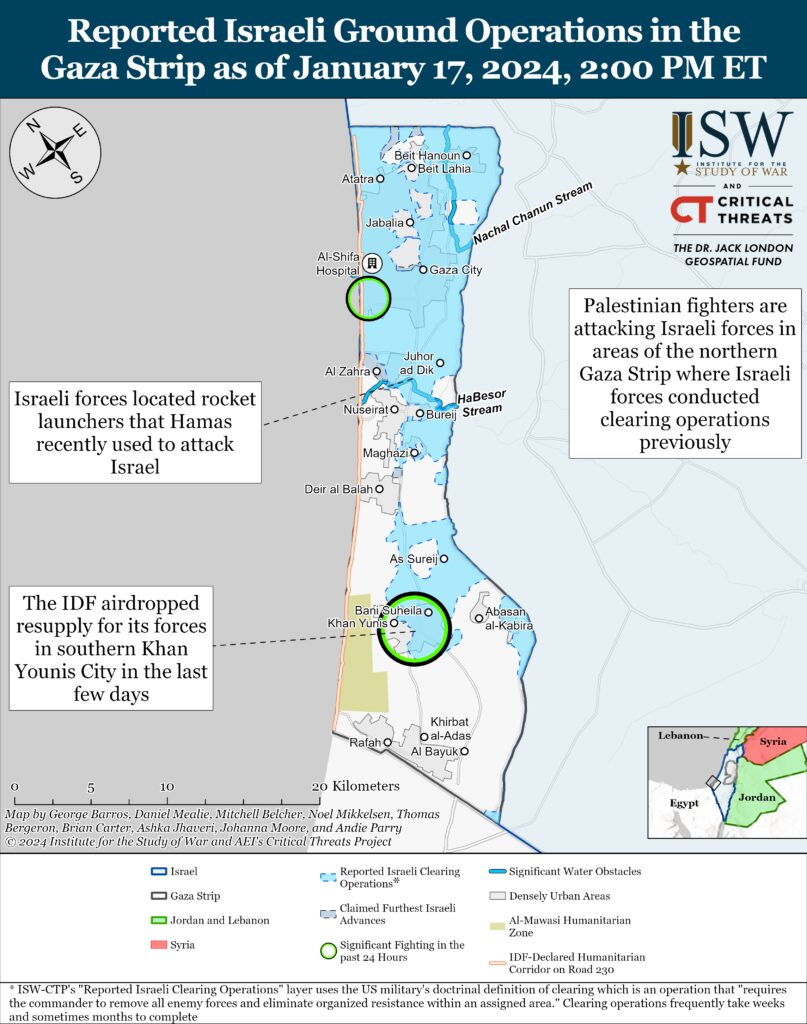
The Gaza Strip is experiencing the longest, largest-scale internet blackout since the Israel-Hamas war began.[xxii] A Palestinian telecommunications company said that the blackout was a result of damaged infrastructure in the southern city of Khan Younis.[xxiii] Repair crews are unable to reach the damaged sites due to airstrikes and fighting between the IDF and Palestinian fighters in the city according to the company.[xxiv] NetBlocks reported on January 17 that telecommunications have been offline in the Gaza Strip for six days.[xxv]
Israel and Hamas began implementing a deal on January 17 that aims to supply medicine for Israeli hostages in exchange for additional humanitarian flow into the Gaza Strip.[xxvi] An anonymous Israeli official told the Washington Post on January 17 that at least one plane carrying medicine landed in Egypt. The Washington Post reported that Hamas Politburo member Musa Abu Marzouk said on X (formerly Twitter) that the delivery of humanitarian aid includes 140 types of medicine that the Red Cross will deliver to four hospitals in the Gaza Strip. The medicine will then be distributed to additional, unspecified locations, including to hostages.[xxvii] The Coordinator of Government Activities in the Territories (COGAT), a unit in the Israeli Ministry of Defense, reported on January 17 that trucks carrying medicine will undergo a security check at the Kerem Shalom crossing.[xxviii]
Hamas’ senior representative to Lebanon Osama Hamdan delivered a speech that criticized Israel’s “third phase” of operations in the Gaza Strip.[xxix] Hamdan said that the United States and Israel are falsely describing the third phase of operations in the Gaza Strip to mislead the public. Israeli media began reporting in December 2023 that the IDF would transition to a third phase of operations that includes securing a buffer zone in the northern Gaza Strip and transitioning to targeted raids.[xxx] Israeli officials have confirmed that the IDF is shifting to fewer ground forces and airstrikes in the Gaza Strip.[xxxi]
Palestinian militias did not claim any indirect fire attacks into Israel from the Gaza Strip on January 17.
West Bank
Axis of Resistance campaign objectives:
Draw IDF assets and resources toward the West Bank and fix them there
Israeli forces clashed with Palestinian fighters in four locations across the West Bank. The al Aqsa Martyrs’ Brigades detonated IEDs and fired small arms targeting Israeli forces during Israeli raids in Tulkarm and Nour Shams refugee camp on January 17.[xxxii] The IDF conducted an airstrike targeting Palestinian fighters who detonated explosive devices targeting Israeli forces during the fighting in Tulkarm.[xxxiii] The IDF also conducted another airstrike targeting an al Aqsa Martyrs’ Brigades commander in Balata camp, Nablus, who the IDF said was planning an attack against an unspecified target.[xxxiv] Palestinian media reported the two airstrikes in Tulkarm and Nablus killed a total of 11 people, including nine fighters.[xxxv] Palestinian fighters detonated an IED targeting Israeli vehicles in Nablus on January 16.[xxxvi]
Hamas’ senior representative to Lebanon, Osama Hamdan, called for Palestinian militias to escalate operations against Israel in the West Bank on January 17.[xxxvii] Hamdan also called on Palestinian Authority security forces to join Hamas. The Jenin Battalion of the al Qassem Brigades claimed that repeated IDF operations in the last three years failed to weaken Palestinian militias in Jenin and that now Palestinian militia groups are expanding into Tulkarm.[xxxviii]
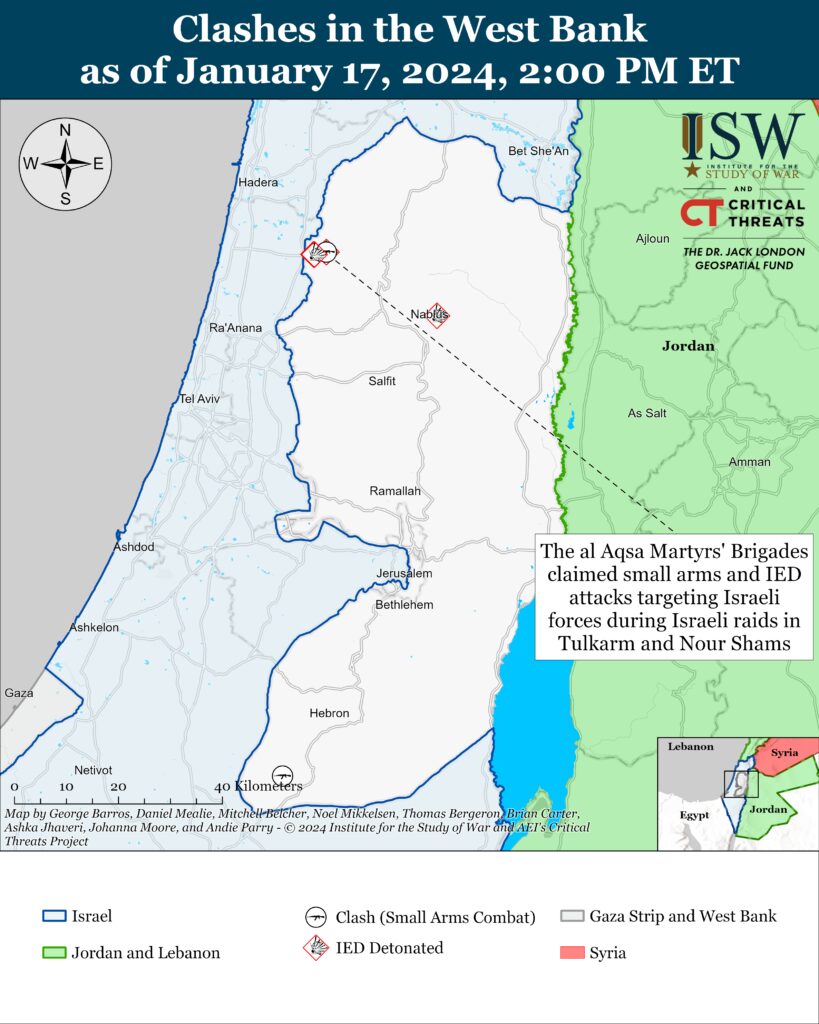
This map is not an exhaustive depiction of clashes and demonstrations in the West Bank.
Southern Lebanon and Golan Heights
Axis of Resistance campaign objectives:
Draw IDF assets and resources toward northern Israel and fix them there
Set conditions for successive campaigns into northern Israel
Iranian-backed militias, including Lebanese Hezbollah (LH), conducted nine attacks from southern Lebanon into northern Israel on January 17.[xxxix] The al Qassem Brigades said that it fired 20 rockets targeting Israeli forces in Liman.[xl] The group said that the attack was in response to Israeli “massacres” against civilians in the Gaza Strip and Israeli attacks targeting Iranian-backed fighters in southern Lebanon.[xli] The al Qassem Brigades also said that it fired a rocket salvo towards Liman on December 25.[xlii] The IDF said that the Israeli Air Force attacked LH infrastructure in multiple locations in southern Lebanon on January 17.[xliii]
IDF Chief of Staff Herzi Halevi said that the likelihood of war in northern Israel is “higher than before” on January 17 while attending IDF drills simulating an offensive in Lebanon.[xliv] Israeli officials, including Halevi, have expressed concerns about the threat that LH poses to Israel and the potential for LH to conduct an attack into Israel like Hamas’ attack on October 7.[xlv] Israeli officials have said repeatedly that they seek a diplomatic solution to push LH fighters north of the Litani River, in accordance with UN Security Council Resolution 1701, but that Israel will use military force if diplomatic efforts fail.[xlvi]
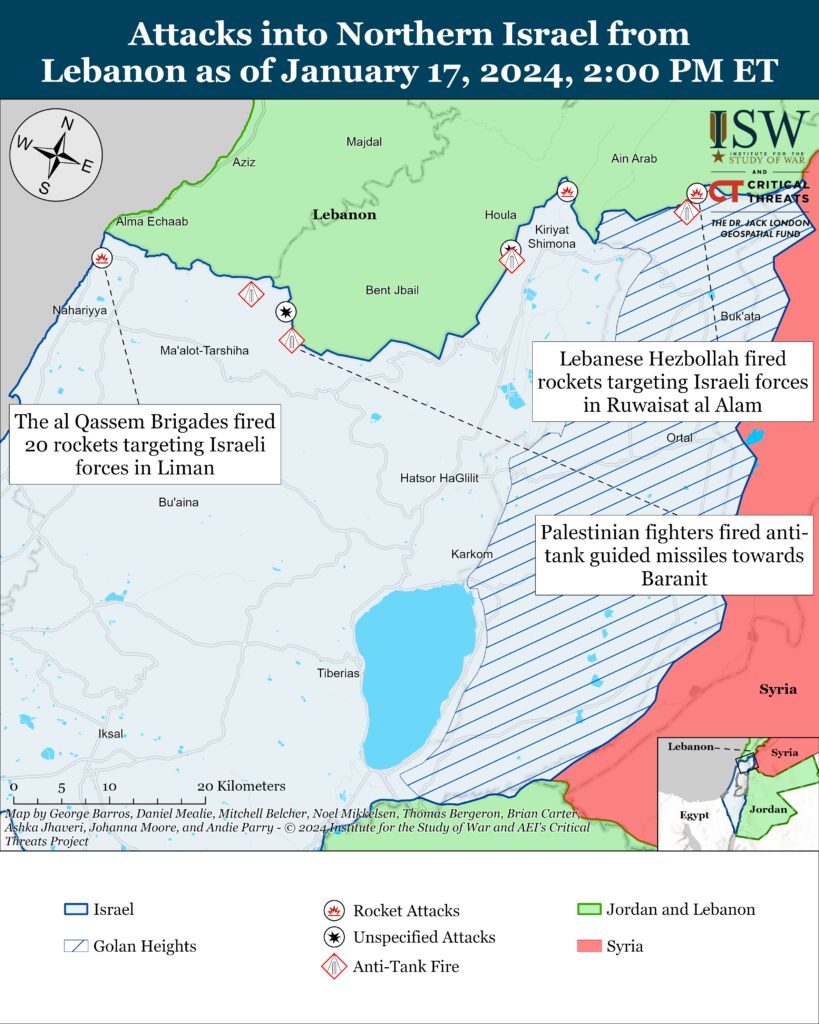
Iran and Axis of Resistance
Axis of Resistance campaign objectives:
Demonstrate the capability and willingness of Iran and the Axis of Resistance to escalate against the United States and Israel on multiple fronts
Set conditions to fight a regional war on multiple fronts
Iraqi Prime Minister Mohammad Shia al Sudani is attempting to retain some US presence in Iraq by restructuring Iraq’s security agreement, despite pressure from Iranian-backed Iraqi groups to expel US forces entirely. Sudani said that his administration would review Iraq’s relationship with the International Coalition and establish bilateral agreements with member countries. Iraq discussed this measure with the United States during the US-Iraq Strategic Dialogue in August 2023.[xlvii] The US-Iraq Strategic Dialogue in August 2023 included the discussion of expanding US-Iraq security cooperation beyond the current counter-ISIS framework under Operation Inherent Resolve to include joint military exercises, training, and officer exchange programs.[xlviii] The diplomatic advisor to the prime minister stated that “the goal is not to get the [United States] out,” but that Iraq needs to “set a timetable” to transition from the US-led anti-ISIS coalition to a “bilateral agreement.”[xlix]
This policy is at odds with Iranian-backed Iraqi actors’ maximalist demands to immediately remove all US forces from Iraq. CTP-ISW has previously assessed that Iranian-backed Iraqi actors have fueled an escalation cycle that aims to prompt US self-defense strikes, which they then misrepresent as violations of Iraqi sovereignty.[l] They use these supposed “violations” to demand the complete removal of US forces from Iraq. The Conquest Alliance, the Iranian-backed Badr Organization’s arm in parliament, submitted a draft law to the Council of Representatives on January 13 that would require Sudani to detail plans to end the US presence in Iraq.[li] The inclusion of this requirement is a key difference between the draft law and the 2020 nonbinding resolution that called for the expulsion of US forces.[lii] The draft law was 77 signatories short of a majority needed to be presented for a vote.[liii] Sudani’s current policy leaves open the possibility for continued US military cooperation in Iraq, though it is still unclear what that bilateral relationship would look like.
The US State Department redesignated the Houthis as specially designated global terrorists (SDGTs) on January 17.[liv] The designation requires US financial institutions to freeze any Houthi assets, but it will not take effect until mid-February. The State Department said that this 30-day delay would ensure the sanctions do not hinder humanitarian aid going to the Yemeni people.[lv] US National Security Adviser Jake Sullivan stated that the United States would reevaluate this designation if the Houthis halted their attacks in the Red Sea.[lvi] The United States briefly listed the Houthis as a Foreign Terrorist Organization from January to February 2021. The Biden Administration lifted the designation in February 2021, citing humanitarian concerns.[lvii]
Houthi Deputy Foreign Minister and powerbroker Hussein al Ezzi threatened on January 16 that the Houthis would consider any measure that harmed Yemeni interests as a declaration of war.[lviii] Ezzi warned that the Houthis could expand their targeting of commercial shipping beyond the Bab al Mandeb through coordination with unspecified actors.[lix] Ezzi controls the Houthi foreign affairs file, not the official foreign minister.[lx] The Houthi spokesperson further reiterated that the US SDGT designation would not change Houthi support for Palestine on January 17.[lxi]
The Houthis said that they fired an unspecified missile that hit a US-owned Marshall Islands-flagged commercial vessel while the vessel transited the Gulf of Aden on January 17.[lxii] The UK Maritime Trade Operations reported that the vessel briefly caught fire but was able to continue to its next port of call.[lxiii] The UK Maritime Trade Operations said that a drone targeted the vessel, not a missile.

Syrian, Western, and Iranian media provided further details on January 17 about the January 15 Islamic Revolutionary Guards Corps missile strike on Syria. UK-based Syrian opposition media Syrian Observatory for Human Rights and a Syrian humanitarian organization reported that the Iranian missile strike targeted an empty, non-operational medical clinic in Idlib.[lxiv] Bloomberg reported that the range at which the IRGC fired the Kheibar Shekan missile on January 15 is nearly the range required for Iran to target Tel Aviv, Israel.[lxv] Armed Forces General Staff (AFGS)-controlled media highlighted that the missile’s name references a Jewish fortress captured by Muslim armies during the Battle of Kheibar in 628. AFGS-controlled media also noted that the purpose of the missile is to target Israel.[lxvi] Israeli media and Iranian officials and media said on January 16 that the IRGC ballistic missile attacks in Idlib, Syria were the furthest that Iran has ever fired a missile.[lxvii]
Western media reported on January 17 that India is attempting to persuade Iran to help shield Indian exporters from Iran-backed Houthi attacks on commercial shipping in the Red Sea.[lxviii] Reuters said that the Indian defense ministry improved its surveillance capabilities in the region and that Indian naval vessels are escorting Indian container ships transiting the Red Sea. The Indian foreign minister met with the Iranian president, Supreme National Security Council secretary, and foreign minister in Tehran on January 15.[lxix] The Iranian and Indian foreign ministers discussed maritime security in the Red Sea during their meeting.[lxx] The Houthis conducted a drone attack targeting the Gabon-flagged Sai Baba commercial vessel with 25 Indian crew members on December 24.[lxxi]
Iranian Foreign Affairs Minister Hossein Amir Abdollahian discussed the IRGC’s January 15-16 strikes in Iraq, Pakistan, and Syria with US media during the World Economic Forum in Davos, Switzerland. The IRGC struck actors in Iraq, Pakistan, and Syria that Iranian leaders accused of trying to destabilize and undermine the regime.[lxxii] Abdollahian described the strikes to CNBC on January 16 as acts of “legitimate self-defense” aimed at combatting terrorism.[lxxiii] Abdollahian separately told CNN on January 17 that Iran respects Iraq and Pakistan’s sovereignty and territorial integrity, but it will not allow terrorists in Pakistan or “Israeli currents” in Iraqi Kurdistan to threaten Iran’s national security.[lxxiv] Abdollahian emphasized that the IRGC drone and missile strikes in Erbil targeted “Mossad agents,” not Iraq. Abdollahian also claimed that the IRGC acted within the framework of the March 2023 security agreement between Tehran and Baghdad. The March 2023 agreement requires Iraqi authorities to disarm and relocate members of Iranian Kurdish opposition groups away from Iran’s borders.[lxxv] Abdollahian may have made this statement in response to Iraqi Defense Minister Thabet al Abbasi’s warning on January 17 that the Iraqi federal government may suspend the agreement with Iran in response to the IRGC’s strikes in Erbil.[lxxvi] Abbasi is a member of a Sunni coalition named the National Resolution Alliance (Al Hasm Alliance).[lxxvii]
Abdollahian also claimed that Pakistan is Iran’s “friend and brother” and that the IRGC strikes in Pakistan did not kill any civilians. Abdollahian likely made this last statement in response to the Pakistani government’s claim that the airstrikes killed two children.[lxxviii] Abdollahian similarly emphasized that the IRGC strikes only targeted members of the Baloch Salafi-Jihadi group Jaish al Adl in a phone call with Pakistani Foreign Affairs Minister Jalil Abbas Jilani on January 17.[lxxix] The Iranian readout of this phone call emphasized Iran’s respect for Pakistan’s territorial integrity and sovereignty, while the Pakistani readout focused on Jilani’s condemnation of the strikes as “an egregious violation of international law and the spirit of bilateral relations between Pakistan and Iran.”[lxxx]
The Pakistani government has strongly condemned and warned of possible retaliation for the IRGC strikes. The Pakistani Foreign Ministry warned on January 17 that Pakistan retains the right to “respond” to the strikes and that “the responsibility for the consequences [of the strikes] will lie squarely with Iran.”[lxxxi] Pakistan also recalled its ambassador to Iran and expelled the Iranian ambassador to Pakistan on January 17.[lxxxii] Pakistan media reported that Pakistan also closed its border with Iran.[lxxxiii] The Pakistani Armed Forces Joint Chiefs of Staff Committee held a meeting on January 17 to discuss possible responses to the strikes.[lxxxiv]
Iranian Foreign Minister Hossein Amir Abdollahian discussed the Israel-Hamas war with various foreign leaders while attending the World Economic Forum in Davos on January 16 and 17. Abdollahian discussed the Israel-Hamas war and bilateral counterterrorism efforts with the interim Prime Minister of Pakistan hours before the IRGC strike on Pakistan on January 16.[lxxxv] Abdollahian said fighting terrorism was one of the most important issues facing Iran and Pakistan. Abdollahian discussed Palestinian self-determination with Lebanese Prime Minister Najib Mikati on January 17.[lxxxvi] Abdollahian also discussed the need for a ceasefire with the Norwegian Foreign Minister on January 17.[lxxxvii] Abdollahian further reiterated the need for a Palestinian-led effort to decide the governance of the post-war Gaza Strip and warned that the Israel-Hamas war could spread throughout the Middle East during the meeting.
Iranian security forces repulsed three Jaish al Adl fighters who attempted to cross the Iran-Pakistan border on January 17.[lxxxviii] Iranian media reported that the Jaish al Adl fighters planned to conduct attacks in Iran.[lxxxix] Iranian security forces killed one fighter. Iranian forces injured two other fighters, who escaped. Iranian security forces captured weapons, ammunition, explosives, and hand grenades that the trio attempted to bring across the border.
Jaish al Adl claimed responsibility for killing an IRGC Ground Forces Colonel in Zahedan, Sistan and Baluchistan Province on January 17.[xc] Colonel Hossein Ali Javadanfar was a member of the IRGC Ground Forces 110th Farsi Independent Special Forces Brigade. Jaish al Adl conducted at least four other attacks targeting Iranian security personnel inside Iran between December 15, 2023, and January 16, 2024.[xci]
 Eurasia Press & News
Eurasia Press & News




